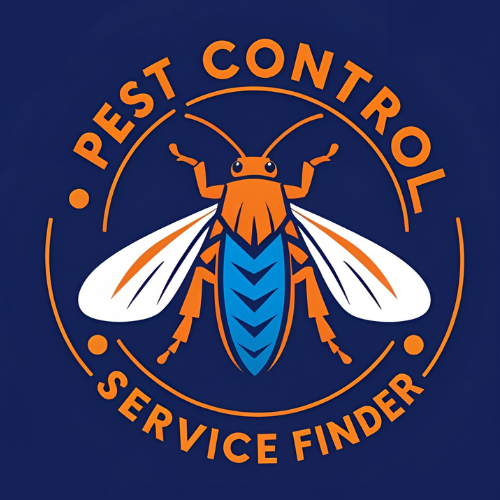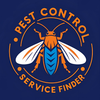Exterminator vs Pest Control Which is Right for You
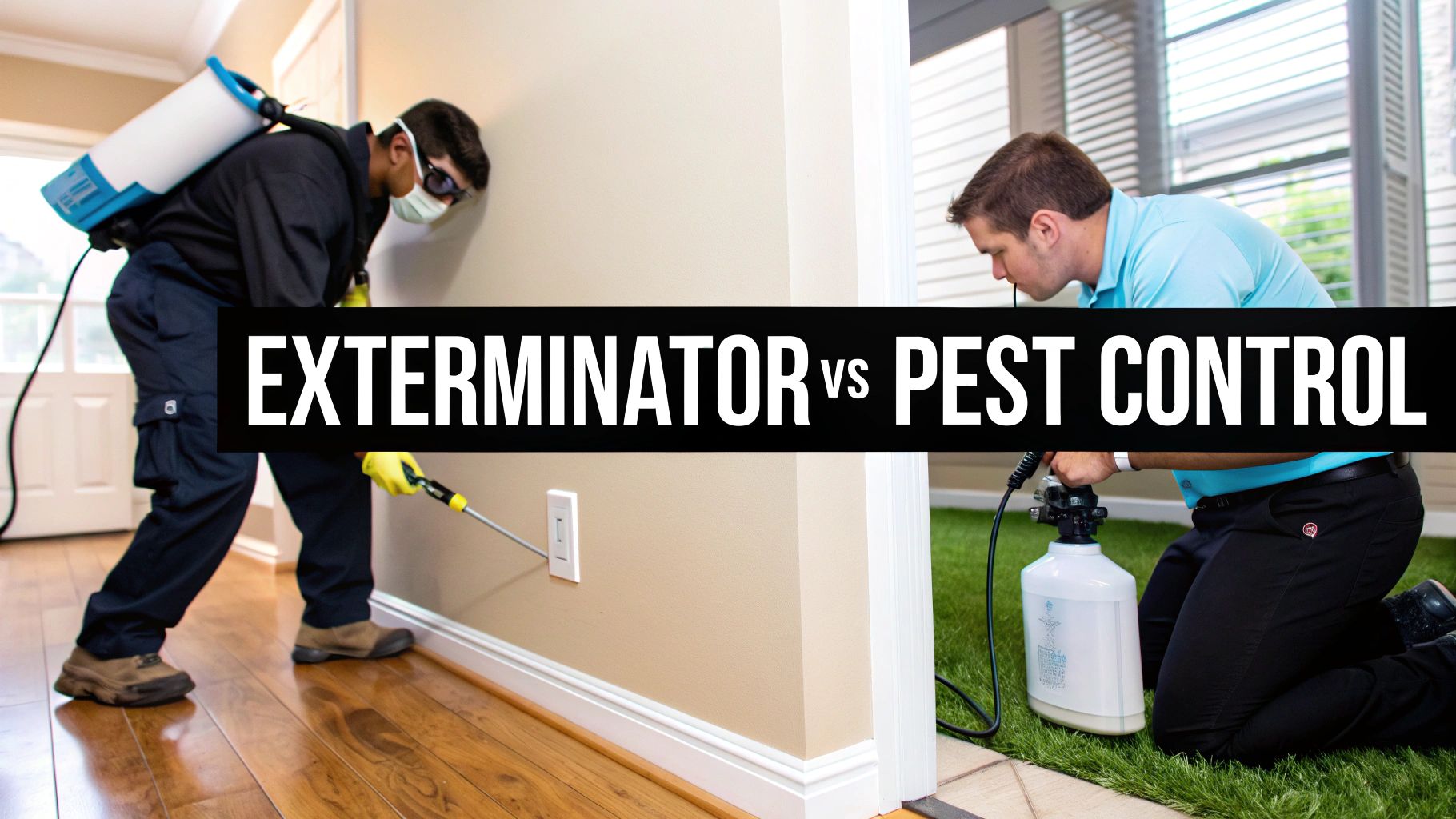
Call +1 855 224 3071. Dealing with a pest issue? For quick help and professional advice, give our specialists a call at +1 855 224 3071 right now.
The main thing separating an exterminator from a pest control service comes down to their game plan. Exterminators are reactive—they show up with chemicals to kill a pest problem you already have. Pest control is proactive—they build a long-term strategy to manage pests, focusing on prevention and figuring out why pests showed up in the first place. For immediate assistance, call +1 855 224 3071.
Understanding the Fundamental Differences
When you find pests in your home, picking the right pro is everything. People often use "exterminator" and "pest control" like they're the same thing, but their approaches and the methods they use are completely different.
Getting this distinction right is the key to taking back your space for good, not just for a few weeks. For immediate help figuring this out, you can call +1 855 224 3071 to get connected with a local expert.
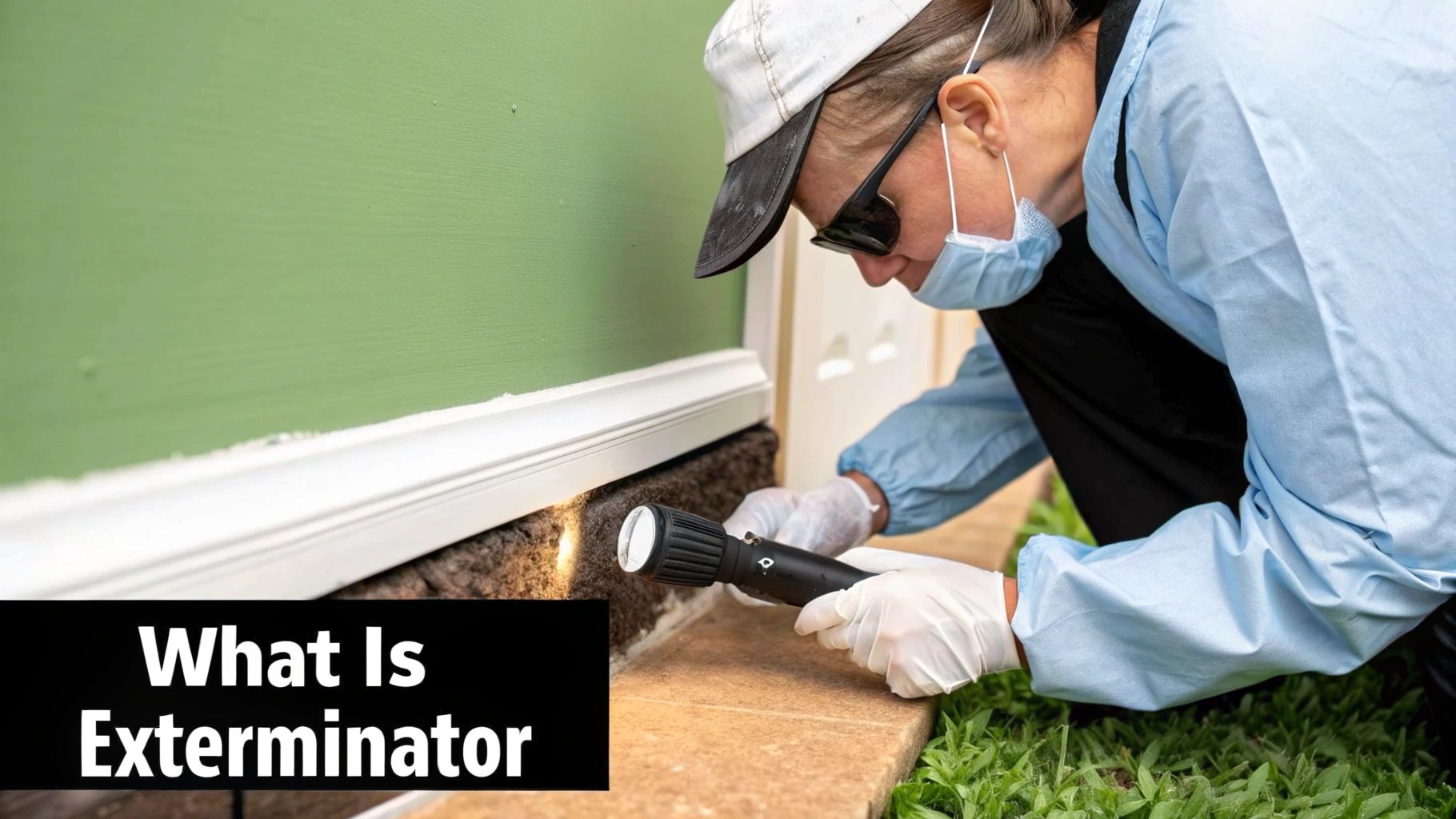
Think of an exterminator's job as a tactical strike. Their number one goal is eradication, and they're called in for urgent, severe infestations where you need the pests gone yesterday. It's a direct, chemical-heavy approach.
On the other hand, a pest control professional is more like a strategist. Their focus is on the "why"—as in, why are pests attracted to your home? This leads to a much more thorough process:
- Inspection: Pinpointing the exact type of pest and how bad the infestation has gotten.
- Identification: Learning about the pest’s habits, life cycle, and what's drawing it in.
- Exclusion: Sealing up any entry points and getting rid of the conditions that pests love.
- Long-Term Monitoring: Putting a plan in place to make sure they don't come back.
This modern strategy, known as Integrated Pest Management (IPM), is all about sustainable, long-term results. While targeted chemicals might be part of the plan, the priority is always on non-chemical solutions first. To see what kind of services are out there, check out our guide on finding the best pest control services near me. For questions, call +1 855 224 3071.
Exterminator vs Pest Control At a Glance
Sometimes you just need a quick breakdown. This table lays out the core differences in philosophy, methods, and service focus to help you see which solution fits your situation.
| Feature | Exterminator (Reactive) | Pest Control (Proactive) |
|---|---|---|
| Primary Goal | Kill existing pests quickly | Manage and prevent future infestations |
| Approach | One-time, chemical-focused application | Ongoing, integrated management plan |
| Methods Used | Broad-spectrum sprays, fumigation | Targeted treatments, exclusion, monitoring |
| Service Model | Typically a single service call | Often a recurring subscription service |
| Focus | Short-term elimination | Long-term prevention and control |
At the end of the day, an exterminator provides a fast fix for an immediate problem, while a pest control service offers a lasting solution to keep your home protected over time. To discuss which is right for you, call +1 855 224 3071.
Comparing Core Philosophies in Pest Removal
Dealing with a pest problem and trying to figure out your next move? Call +1 855 224 3071 to talk to a professional who can walk you through your options. The real difference between an exterminator and a pest control service isn't just the name—it’s the entire philosophy behind what they do. Getting this distinction is the key to picking the right long-term solution for your home.
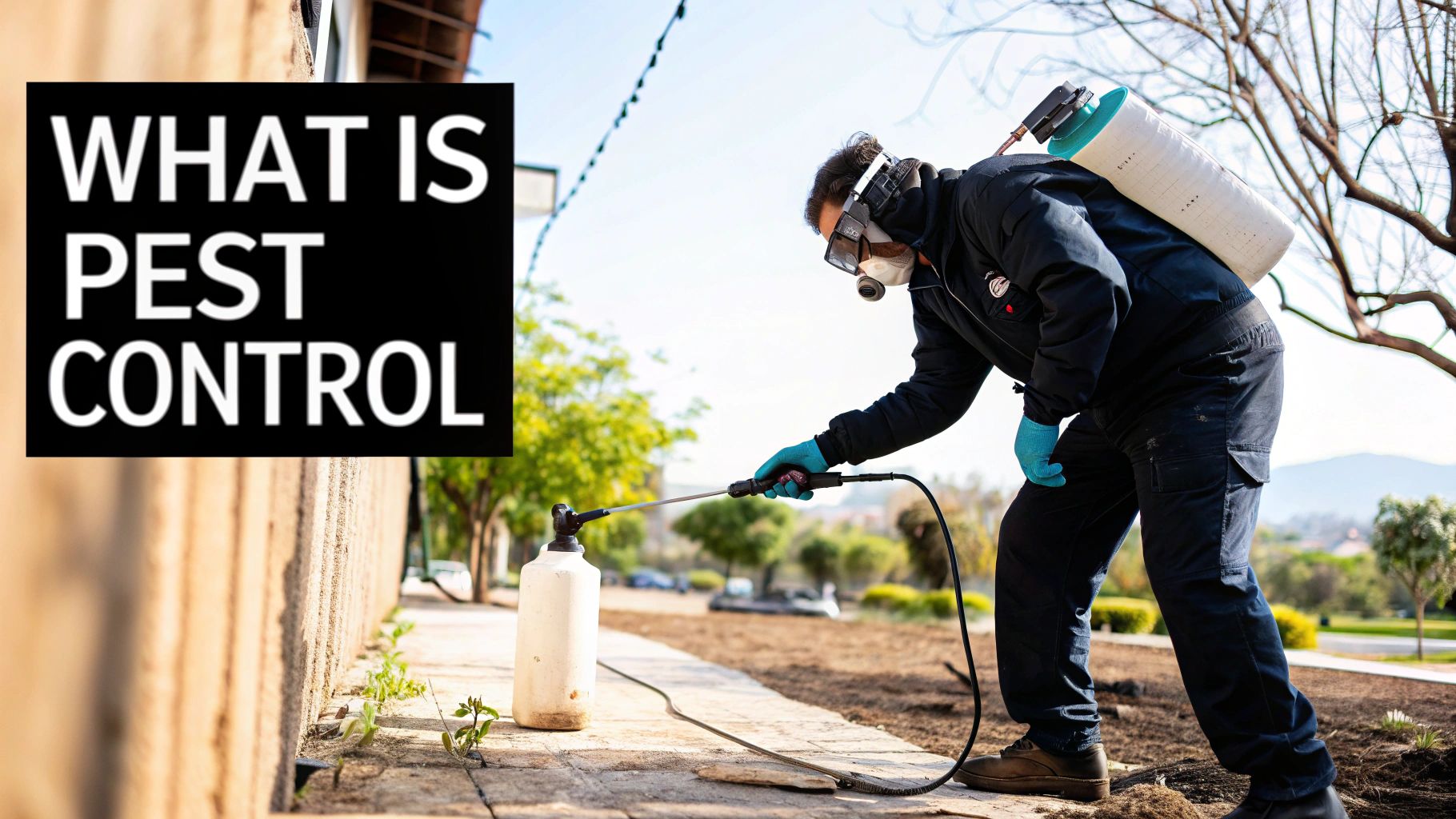
Traditionally, an exterminator works with a reactive, single-mission mindset: eradication. When you’ve got a full-blown infestation on your hands, their goal is to eliminate the pests you see, and do it fast. This job often calls for powerful, broad-spectrum chemicals designed to kill on contact.
This approach is born from urgency. Think of it like calling the fire department—when there's a wasp nest inside your wall, the only goal is neutralizing that immediate threat. The focus is entirely on the "what," not the "why."
The Exterminator’s Tactical Strike
An exterminator’s methods are typically direct and powerful. They’re specialists in rapid removal, using techniques meant for maximum impact in a short amount of time.
- Chemical Application: The go-to tool is often a potent pesticide applied directly to the problem area.
- One-Time Solution: The service is usually a one-off visit to handle the current crisis.
- Immediate Goal: Success is measured by wiping out the visible pest population completely.
While this tactical strike is necessary for certain situations, it doesn't get to the root of the problem. It won’t address the conditions that attracted pests to begin with, which means a new infestation is always a possibility.
The Pest Control Management System
Modern pest control, on the other hand, operates on a completely different philosophy. It’s a proactive, science-backed management system built not just to get rid of pests now, but to stop them from ever coming back. If that sounds more like what you need, call +1 855 224 3071 to get a personalized plan.
This strategy is all about understanding pest biology, behavior, and what they need to survive. A pest control pro doesn't just ask "what" pest you have; they dig deeper to find out "why" it's there and "how" it got inside.
The core of modern pest management is a partnership. It's about working with a professional to make your home an environment where pests simply can't thrive, delivering a sustainable solution instead of just a temporary fix.
The foundation of this philosophy is Integrated Pest Management (IPM). IPM is a smarter, multi-layered approach that puts non-chemical and low-toxicity methods first. It's a strategic investment in the long-term health of your property. You can dive deeper into this method in our guide on what is Integrated Pest Management.
The IPM process is a continuous cycle:
- Thorough Inspection: A top-to-bottom assessment to find pests, entry points, and attractants like food and water.
- Accurate Identification: Knowing the exact pest is critical, since different species require different strategies.
- Strategic Action: A custom plan that could include sealing cracks (exclusion), removing clutter (habitat modification), and using targeted, low-impact treatments.
- Ongoing Monitoring: Regular check-ins to make sure the plan is working and to adjust as needed.
Ultimately, the choice between an exterminator and pest control comes down to your goal. Are you looking for a quick fix for an immediate crisis, or a long-term defense to protect your home for good? Your answer will point you to the right professional. For help deciding, call +1 855 224 3071.
Analyzing Treatment Methods and Applications
When you're staring down a pest problem, figuring out the right treatment plan is half the battle. If you're not sure where to start, give us a call at +1 855 224 3071 for a professional consultation. The real difference between an exterminator and a pest control pro comes down to the tools they use and their overall strategy.

You can really see the contrast when you put their methods side-by-side. An exterminator often brings overwhelming force for an immediate knockout, while a pest control expert focuses on a sustainable, long-game defense. This core difference shapes everything from safety and environmental impact to whether or not those pests make a comeback.
The Exterminator’s Arsenal
You call an exterminator when you have a full-blown crisis—a severe, dug-in infestation that needs a heavy-handed solution right now. Their methods are all about maximum impact and fast results.
- Broad-Spectrum Sprays: Think of this as the shock-and-awe approach. Powerful liquid pesticides are applied over large areas to kill pests like roaches or ants on contact, drastically cutting down their numbers fast.
- Fumigation: This is the nuclear option. The entire structure is tented and filled with a gaseous pesticide. It’s the go-to for serious, widespread infestations of wood-destroying insects like termites or bed bugs that have gotten everywhere.
- Bombing (Foggers): These aerosol foggers are designed to fill an entire room with pesticide. They’re great at killing exposed pests but often can't reach into the cracks and hideaways where the real problem lives.
These tactics are undeniably effective for wiping out pests. The trade-off? You and your pets will likely need to clear out for a while to avoid the potent chemicals. For these kinds of urgent situations, call +1 855 224 3071 to get connected with a specialist who can handle it.
The Pest Control Professional’s Toolkit
Pest control pros come equipped with a much more diverse set of tools, all guided by a philosophy called Integrated Pest Management (IPM). The game plan is to use targeted, low-impact solutions that get to the root of the problem.
The modern approach to the exterminator vs pest control debate centers on precision. Instead of a chemical sledgehammer, pest control professionals use a scalpel, targeting the problem with minimal disruption to your home and the environment.
Their varied toolkit means they can build a custom strategy for whatever you're dealing with.
- Targeted Baits: These smart baits use slow-acting insecticides that pests take back to the nest. This method is a game-changer for social insects like ants and cockroaches, as it eliminates the entire colony from the inside.
- Insect Growth Regulators (IGRs): IGRs are a clever preventative tool. They mess with a pest's life cycle, stopping larvae from growing into reproducing adults. It’s like stopping an infestation before it even starts.
- Exclusion Tactics: A huge part of IPM is simply blocking pests out. This means a technician will physically seal up the cracks, gaps, and other weak points in your foundation, walls, and roof that pests use as an entry ramp.
- Habitat Modification: Sometimes, you just have to make your home less inviting. This could mean getting rid of standing water that mosquitoes love or trimming back bushes that give bugs a bridge to your house.
Homeowners are increasingly choosing these smarter, more sustainable methods. It's why the pest control market is expected to jump from $22.7 billion in 2022 to $29.1 billion by 2026. People are more aware of health risks and the massive economic damage pests cause—termites alone cause $5 billion in property damage annually in the U.S. You can discover more insights about these industry trends and what they mean for homeowners.
Treatment Method Breakdown
To see how these philosophies play out in the real world, let's compare some common treatment approaches. The table below breaks down what each method is best for and its long-term impact.
| Treatment Method | Typical Use Case | Primary Approach (Exterminator or Pest Control) | Long-Term Effectiveness |
|---|---|---|---|
| Broad-Spectrum Sprays | Large, visible infestations of roaches, ants, spiders | Exterminator | Low; kills active pests but doesn't stop re-infestation. |
| Fumigation | Severe, widespread termites or bed bugs | Exterminator | High for the current infestation, but requires prevention. |
| Targeted Baits | Ant, cockroach, and rodent colonies | Pest Control | Very High; eliminates the source (colony/nest). |
| Exclusion & Sealing | Preventing entry of rodents, insects, and wildlife | Pest Control | High; provides a permanent physical barrier. |
| Insect Growth Regulators | Fleas, cockroaches, and stored product pests | Pest Control | High; breaks the life cycle for lasting prevention. |
As you can see, the choice isn't just about killing pests today—it's about keeping them from coming back tomorrow. For help, call +1 855 224 3071.
A Real-World Scenario: Persistent Ants
Let's put this into practice with a common headache: ants that just won't leave your kitchen alone. The difference in the exterminator vs pest control approaches is crystal clear here.
- An Exterminator’s Approach: The exterminator would spot the ant trails and immediately treat the area with a broad-spectrum spray along baseboards, countertops, and wherever they see activity. You’d get instant relief as the visible ants die off. But since the hidden colony is still active, they’ll be back as soon as the spray wears off.
- A Pest Control Professional’s Approach: The pro starts with an investigation. Where are they coming from? What are they eating? They'd place targeted ant baits that foraging ants carry back to the queen, wiping out the entire colony. To finish the job, they’d seal the entry points the ants were using and give you tips on food storage to make sure the problem is solved for good.
Understanding Service Models and Cost Structures
The biggest difference between an exterminator and a pest control service often boils down to how they operate and how you pay them. If you’re not sure which model fits your budget or situation, give us a call at +1 855 224 3071 for a straight-up breakdown. The way they price their work and guarantee it says everything about their philosophy.
An exterminator usually works on a simple, one-time service model. You see a hornet nest or a swarm of roaches, you call them, and you pay a flat fee to get rid of that specific problem. It’s a reactive approach designed for a single, urgent crisis. Think of it as a quick fix.
Pest control services, on the other hand, are built on a proactive, ongoing relationship. It's almost always a subscription plan. They start with a deep inspection and an initial treatment, then follow up with regular maintenance visits to keep pests out for good. This recurring model is all about preventing infestations before they even start.
Analyzing the Financial Trade-Offs
When you look at the cost, don't just focus on the first bill. An exterminator’s one-time fee might look like a great deal upfront, but it doesn't solve the why. It doesn't address the conditions that brought pests to your door in the first place, which often leads to another infestation and another one-off payment down the road.
A recurring pest control plan is a consistent expense, but think of it as an investment in your property. By stopping future problems like termite damage or a major cockroach takeover, this proactive model can save you a ton of money and stress in the long run. For a closer look at what to expect, check out our guide on the cost of pest control services.
There’s a reason this subscription model dominates the residential market. The U.S. structural pest control industry brought in over $12.6 billion in a single year, and a massive 85.2% of residential revenue came from these recurring plans. Homeowners have voted with their wallets—they see the value in long-term protection. You can read the full analysis on pest control industry growth to see the data for yourself.
Comparing Service Guarantees and Warranties
Guarantees are another huge dividing line. An exterminator’s work is typically backed by a short-term warranty that’s very specific—it covers only the pest they treated in the exact spot they treated it. If the same bugs show up again within a short window, like 30 days, they’ll probably come back for a re-spray at no charge.
A service guarantee reveals the provider's core philosophy. An exterminator guarantees the elimination of a current problem, while a pest control company guarantees the ongoing protection of your home.
Pest control companies offer something much bigger: a broad, year-round guarantee that's part of your service agreement. This promise usually covers a whole list of common household pests. If any of those covered critters pop up between your scheduled visits, they’ll send a technician back to take care of it, typically for free.
Here’s a quick comparison of what you can expect:
Exterminator Guarantee:
- Scope: Limited to the specific pest and treatment area.
- Duration: Short-term, usually 30-90 days.
- Focus: Making sure the immediate problem is gone.
Pest Control Guarantee:
- Scope: Covers a wide range of pests across your entire property.
- Duration: Ongoing, as long as your service plan is active.
- Focus: Keeping your home pest-free, period.
Ultimately, the right choice depends on your needs right now and your goals for the future. For a fast, one-and-done solution to an immediate problem, an exterminator's model can work just fine. But if you want lasting peace of mind and real prevention against future invasions, a recurring pest control plan is almost always the more reliable and cost-effective route.
For a recommendation tailored to your situation, don't hesitate to call an expert at +1 855 224 3071.
When to Choose an Exterminator or Pest Control
When you've got a pest problem, making the right call is everything. For immediate help and a professional recommendation, call our specialists at +1 855 224 3071. Your decision between calling an exterminator or hiring a pest control service really boils down to your specific situation—what kind of pest you're dealing with, how bad the infestation is, and what you want for your property in the long run.
This isn't just about getting rid of bugs; it's about picking the right strategy. This guide breaks down real-world scenarios to make the choice clear.
This decision tree gives you a quick visual breakdown based on how severe the problem is and whether you need ongoing prevention.
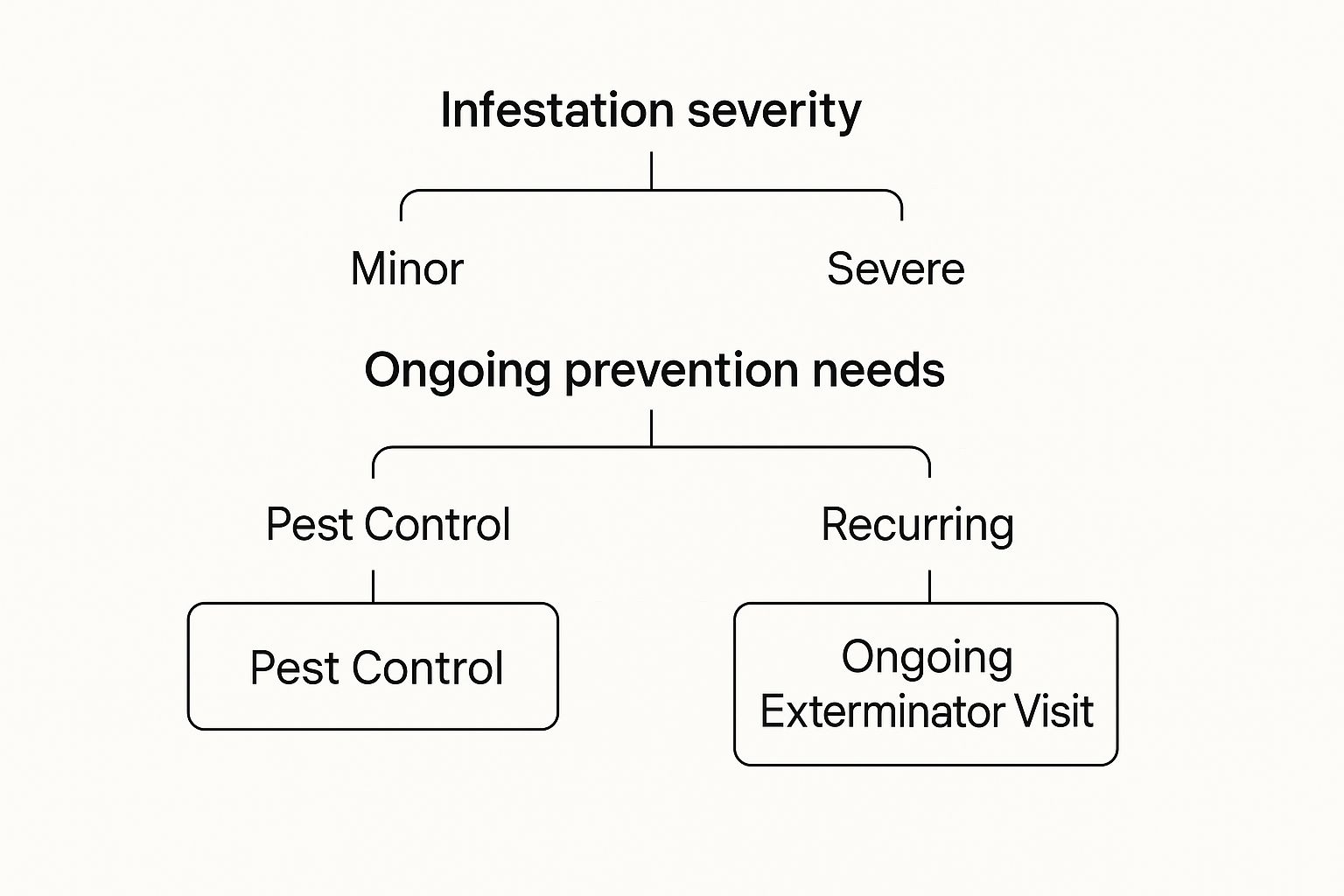
As you can see, a serious, one-off infestation usually means you need an exterminator. For smaller issues or if you want to keep pests out for good, pest control is the way to go.
Situations Demanding an Exterminator
Think of an exterminator as your emergency response unit. They come in to neutralize a severe, immediate threat using powerful, fast-acting methods. You call an exterminator when a problem has gotten out of hand and is a direct threat to your home or safety.
Here are a few urgent scenarios where an exterminator is a must:
- An Aggressive Wasp or Hornet Nest: Finding a huge nest inside a wall, in the attic, or right by your front door is not a DIY situation. An exterminator has the professional gear and potent treatments to eliminate that threat safely and quickly.
- A Severe Bed Bug Outbreak: Once a bed bug problem spreads beyond one mattress and throughout a room, you need aggressive, intensive treatment. An exterminator’s tools, like heat treatments or fumigation, are designed for complete eradication in these advanced cases.
- An Advanced Termite Infestation: If you discover a large, destructive termite colony, you need immediate action to stop further structural damage. Fumigation, a classic extermination service, is often the only way to guarantee the entire colony is gone.
In these cases, the number one goal is rapid elimination. You can figure out the "why" later; the immediate priority is to solve the crisis. If you're facing an emergency like this, call +1 855 224 3071 right now for an urgent dispatch.
Scenarios Where Pest Control is the Right Move
A pest control service acts as your long-term partner in protecting your home. Their approach is strategic, proactive, and all about preventing pests from becoming a problem in the first place. This is the perfect option for homeowners looking for lasting peace of mind.
Choose a pest control professional for situations like these:
- Occasional Pest Sightings: See a few ants on the counter, a spider in the basement, or silverfish in the bathroom? That’s a sign of a weak spot in your home's defense. A pest control expert will find the entry points and root causes to stop a small issue from turning into a full-blown infestation.
- Moving into a New Home: Starting fresh is the best time to be proactive. A full pest control inspection and an initial preventative treatment will establish a protective barrier around your new property, keeping it pest-free from day one.
- Managing Pests in Sensitive Environments: In a home with kids, pets, or family members with allergies, the targeted, low-impact methods of Integrated Pest Management (IPM) are critical. Pest control pros always prioritize non-chemical solutions and only use the safest products available when absolutely necessary.
The core difference in the exterminator vs pest control decision is mindset. An exterminator solves a problem that exists right now. A pest control professional prevents problems from ever happening.
Ultimately, pest control is about sustainable, long-term management. It gets to the bottom of what's attracting pests, offering a comprehensive solution that an exterminator's one-time service isn't built for. For a consultation on a preventative plan, contact us at +1 855 224 3071.
Making the Right Choice for Your Home and Family
When it comes down to it, choosing between an exterminator and a pest control service is all about protecting your property and keeping your family safe. If you're stuck and need advice tailored to your situation, give our experts a call at +1 855 224 3071 for a no-obligation consultation.
Though people often use the terms interchangeably, a modern pest control professional offers a far more complete and forward-thinking strategy for most homeowners. An exterminator is the person you call for a quick, aggressive fix to a sudden crisis. But the real long-term value comes from the strategic, proactive approach of Integrated Pest Management (IPM). IPM is about understanding how pests think and behave to make your home a place they want to avoid altogether.
Your Decision-Making Checklist
Before you hire anyone, you need to ask some tough questions. This is the only way to ensure you’re bringing in a partner whose methods actually match your goals for safety and lasting results.
Here’s what you absolutely must ask:
- What is your approach to Integrated Pest Management (IPM)? Their answer tells you if they’re just spraying chemicals or if they have a real strategy for prevention.
- Are your technicians licensed, bonded, and insured? This isn't negotiable. It protects you from liability and proves they’re a legitimate operation.
- What are your service guarantees? You need to know exactly what’s covered, for how long, and what happens if pests show up again between scheduled visits.
- Can you provide a detailed, written estimate? A reputable company will never hesitate to give you a clear breakdown of all costs before starting any work.
Choosing a pest service isn't just a one-time fix; it's an investment in your property's future. The right provider becomes a long-term partner, focusing on sustainable prevention rather than just temporary removal.
This shift toward professional, ongoing service relationships is exactly why the industry is booming. The global pest control market has soared to an estimated $28.4 billion, driven by denser housing and a growing awareness of health issues tied to infestations. These aren't simple problems you can solve with a store-bought trap anymore. Learn more about the extermination and pest control industry market research to see the data behind these trends.
For a professional look at your specific pest problem and to figure out the smartest course of action, call our experts today at +1 855 224 3071.
Still trying to figure out the best service for your situation? Give us a call at +1 855 224 3071 for a free consultation. We can walk you through your options and give you some professional advice, no strings attached.
This section tackles the most common questions we hear from homeowners trying to choose between an exterminator and a pest control service. We'll give you quick, clear answers to help you make the right call.
Frequently Asked Questions
It's easy to get turned around when dealing with pest removal. Here are some straightforward answers to help you understand the real differences in safety, service setup, and what you can expect to pay.
Is Pest Control Safer Than an Exterminator?
In most cases, yes. Modern pest control operates on a principle called Integrated Pest Management (IPM), which is widely considered safer for families, kids, and pets. An IPM approach always starts with non-chemical solutions first—like finding and sealing up cracks where pests get in—and only uses targeted, low-toxicity treatments when absolutely necessary.
A traditional exterminator, on the other hand, might go straight for the heavy-duty chemical sprays designed for a quick knockdown. If safety is your number one priority, a pest control professional is almost always the better choice. Feel free to call us at +1 855 224 3071 to discuss safe and effective solutions.
Can I Hire a Professional for a One-Time Service?
You absolutely can. A one-time treatment is the classic "exterminator" model, and it's perfect for isolated problems. Think of a single wasp nest on your porch or a hornets' nest in a tree—that's a situation where a one-and-done service works great.
But for pests that have hidden colonies, like ants, roaches, or termites, a single spray is often just a temporary fix. It might kill the pests you see, but it won't touch the source. That’s where a recurring pest control plan comes in. It’s designed to break the entire pest life cycle and create a protective barrier to keep them from coming back.
The key takeaway is that one-time services solve a visible symptom, while ongoing pest control solves the underlying problem. Choosing the right one depends on whether you need a quick fix or a lasting solution.
What Is the Average Cost for Pest Services?
Costs can be all over the map depending on where you live, what kind of pest you’re dealing with, and how bad the infestation is.
- One-Time Extermination Visit: You can expect this to run anywhere from $250 to over $600. Big jobs that require fumigation will be on the higher end of that scale.
- Recurring Pest Control Plan: These plans typically cost between $40 and $70 per month. Many companies have a higher initial fee for the first big treatment and inspection.
While the one-time fee looks cheaper on paper, a preventative plan often saves you a lot of money and headaches down the road by stopping major infestations before they start. If you have questions about pricing for your specific issue, call +1 855 224 3071 for a clear, transparent quote.
When you need fast, reliable help from licensed and insured professionals, turn to Pest Control Service Finder. We connect you with local experts 24/7 for same-day service, ensuring your home is protected without delay. Get a no-obligation quote and reclaim your home today.
